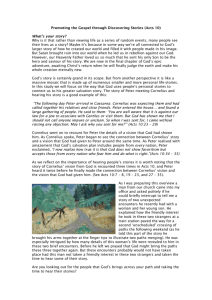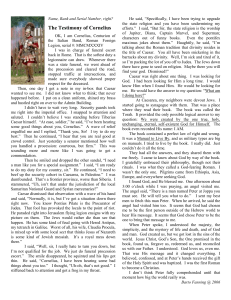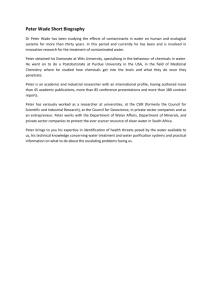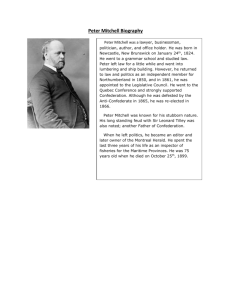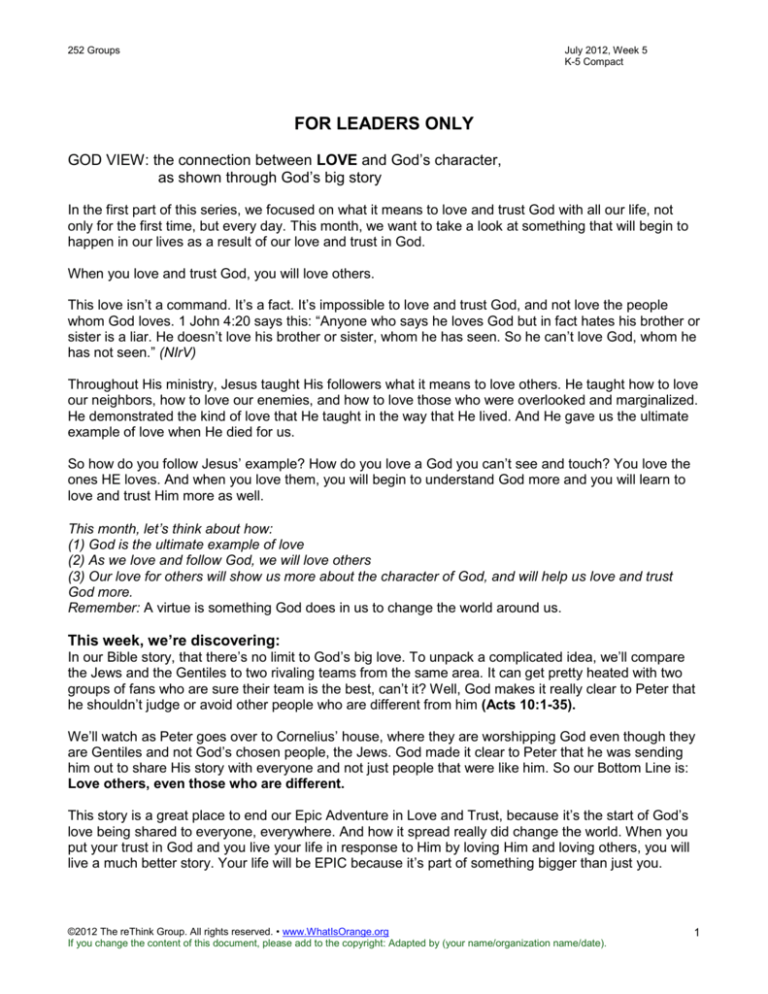
252 Groups
July 2012, Week 5
K-5 Compact
FOR LEADERS ONLY
GOD VIEW: the connection between LOVE and God’s character,
as shown through God’s big story
In the first part of this series, we focused on what it means to love and trust God with all our life, not
only for the first time, but every day. This month, we want to take a look at something that will begin to
happen in our lives as a result of our love and trust in God.
When you love and trust God, you will love others.
This love isn’t a command. It’s a fact. It’s impossible to love and trust God, and not love the people
whom God loves. 1 John 4:20 says this: “Anyone who says he loves God but in fact hates his brother or
sister is a liar. He doesn’t love his brother or sister, whom he has seen. So he can’t love God, whom he
has not seen.” (NIrV)
Throughout His ministry, Jesus taught His followers what it means to love others. He taught how to love
our neighbors, how to love our enemies, and how to love those who were overlooked and marginalized.
He demonstrated the kind of love that He taught in the way that He lived. And He gave us the ultimate
example of love when He died for us.
So how do you follow Jesus’ example? How do you love a God you can’t see and touch? You love the
ones HE loves. And when you love them, you will begin to understand God more and you will learn to
love and trust Him more as well.
This month, let’s think about how:
(1) God is the ultimate example of love
(2) As we love and follow God, we will love others
(3) Our love for others will show us more about the character of God, and will help us love and trust
God more.
Remember: A virtue is something God does in us to change the world around us.
This week, we’re discovering:
In our Bible story, that there’s no limit to God’s big love. To unpack a complicated idea, we’ll compare
the Jews and the Gentiles to two rivaling teams from the same area. It can get pretty heated with two
groups of fans who are sure their team is the best, can’t it? Well, God makes it really clear to Peter that
he shouldn’t judge or avoid other people who are different from him (Acts 10:1-35).
We’ll watch as Peter goes over to Cornelius’ house, where they are worshipping God even though they
are Gentiles and not God’s chosen people, the Jews. God made it clear to Peter that he was sending
him out to share His story with everyone and not just people that were like him. So our Bottom Line is:
Love others, even those who are different.
This story is a great place to end our Epic Adventure in Love and Trust, because it’s the start of God’s
love being shared to everyone, everywhere. And how it spread really did change the world. When you
put your trust in God and you live your life in response to Him by loving Him and loving others, you will
live a much better story. Your life will be EPIC because it’s part of something bigger than just you.
©2012 The reThink Group. All rights reserved. • www.WhatIsOrange.org
If you change the content of this document, please add to the copyright: Adapted by (your name/organization name/date).
1
252 Groups
July 2012, Week 5
K-5 Compact
Guess Who’s Coming to Dinner?
Bible Story: Guess Who’s Coming to Dinner? (Peter and Cornelius) • Acts 10:1-35
Bottom Line: Love others, even those who are different.
Memory Verse: “Love your neighbor as yourself.” Matthew 22:39, NIV
Virtue: Love—choosing to give someone your time and friendship no matter what.
Basic Truth: I should treat others the way I want to be treated
Plug In: Focus the Energy (Small Groups, 10-15 minutes)
Focus the energy on today’s Bible story in a Small Group setting with an engaging discussion question
and an interactive opening activity.
Before students arrive, pray for each regular attendee by name. Pray for those who might visit your
class for the first time. Pray that God would show the kids that His love is for everyone, even people
that feel too different from them. Pray that they would understand how they too can help change the
world by sharing this good news!
1. Early Arriver Idea
What You Need: an offering container
What You Do:
Ask your group if anyone forgave someone this past week. Ask how it went and how it felt. Did it
change their attitude or the way their heart felt? Can they think of a time when someone forgave them
or they forgave someone else and it was a really big deal? Why?
2. Which Doesn’t Belong?
What You Need: “Which Doesn’t Belong?” (Activity Page)
What You Do:
Stand at the front of the group and call out the three people, objects, or places written on the first card.
Ask the group which one doesn’t belong. The first person to raise their hand and correctly guess gets to
come up and read the next card. Continue playing until the cards have all been read and correctly
guessed.
TO ADAPT FOR OLDER KIDS or IF YOU HAVE ADDITIONAL TIME: Have them come up with their
own three objects and try to stump each other! (Remind them to have a good reason for why one does
not fit!)
What You Say:
[Transition] “Just like these cards, we each have something that makes us stand out.
Sometimes it can be hard to spot our differences. Sometimes it can be a little too easy. Let’s go
to Large Group and learn about what to with those differences.”
Lead your group to the Large Group area.
©2012 The reThink Group. All rights reserved. • www.WhatIsOrange.org
If you change the content of this document, please add to the copyright: Adapted by (your name/organization name/date).
2
252 Groups
July 2012, Week 5
K-5 Compact
Power Up: Engage the Heart (Large Group, 20-25 minutes)
Engage children’s hearts in a Large Group setting through interactive worship, prayer, and an
innovative re-telling of today’s Bible story.
SFX: Play high-energy music as kids enter.
Assistant enters. You can continue on with the optional
“EPIC” talent search from last month, or just go straight
into the script. Assistant should be wearing a number of
accessories, such as a baseball cap, crazy socks and/or
shoes, brightly colored shirt, etc.
Opener
ASSISTANT: “Goooood morning, you guys! It’s hard to believe we’re nearing the end of the summer.
And what an epic summer it has been. We’ve learned so much about trust and love, and have had a
blast doing it! Remember, we’ve learned that love is …”
CG: Virtue Slide
“… choosing to give someone your time and friendship no matter what. Sometimes that’s easy,
sometimes, not so much. Today, we’re going to talk about when it’s hard to love someone, like when
they’re different from us. It’s harder to love someone when they’re not like us, isn’t it? But our Bible
verse for the month gives us a clear picture of how we should love EVERYONE. Do you remember
what the verse is? (Pause for their responses.) You rock!
CG: Memory Verse Slide
ASSISTANT: “Hey, Can you hang on for a second? I’ll be right back! You can enjoy some fun listening
music while I’m gone.
SFX: Play some loud, crazy music while the Assistant runs off stage
Assistant runs back on stage, changed into different
accessories—some more obvious than others, like a
different hat, different shoes, a tie or necklace, shirt insideout, a jacket of some sort, etc. Have five things be
different. Be sure at least one change is really hard to
spot—like a new belt or adding a watch.
ASSISTANT: “Sorry about that! I had to make a few changes. Do you like my new look? (Turn around
to show off the new attire.)
“The question is, how many of you were paying attention and noticed what I was wearing before? Five
things are different—who thinks they know all five things? Raise your hand.
Pick a volunteer.
“Okay, come up on stage and tell everyone what five things you think are different.
©2012 The reThink Group. All rights reserved. • www.WhatIsOrange.org
If you change the content of this document, please add to the copyright: Adapted by (your name/organization name/date).
3
252 Groups
July 2012, Week 5
K-5 Compact
Hopefully the volunteer won’t get all them right the first
time. (If they do, the game is over!) Tell the crowd how
many the volunteer got right without revealing which ones
were right. Say something like, ‘Johnny got three out of five
right. Who thinks they know all five?’ Take new volunteers
until someone gets them all right. If it’s proving too difficult,
tell the kids which ones they’ve guessed correctly so far.
“Awesome! You guys really paid attention. That was really fun! But as much fun as it was, in real life it’s
not always fun to have our differences pointed out, is it? I mean, being different isn’t bad; in fact, I think
most of the time, it’s pretty cool. But when our differences keep us from showing love to each other,
that’s not cool at all. In today’s story, we’re going to learn that when we include someone who’s
different than us, it can have epic results. So, you guys keep paying attention!”
Assistant exits and Leader enters.
Worship
LEADER: “Hey everyone! Hasn’t it been awesome learning about love this month? Jesus talked in the
Bible about how important love is. He told us to love Him with all our heart, soul, mind and strength.
Let’s sing a song about loving the Lord! Wave your hands if you’re ready to sing it out loud with me!”
(Get a reaction, repeat if needed.)
SFX: “Love the Lord” / track 2 from Loud & Clear!
LEADER: “This song is a great reminder to us. Let’s make it our prayer today that through our lives we
would show Jesus and others how much we love Him! Let’s sing this together.”
SFX: “I Want to Love You” / track 5 from The Way I Was Made
As Leader tells the story, he should periodically hold up the
Bible, thumb through it, etc., to remind kids that the story
really did happen and it’s part of God’s big story.
SETTING UP THE STORY
LEADER: (Hold your Bible up.) “This month, we’ve been learning what Jesus told His followers. Last
week, we talked about some important instructions that Jesus gave to His disciple, Peter. Do you
remember what those instructions were? I’ll give you a hint. Jesus told Peter to feed His—what?
Wait for their responses.
“That’s right, Jesus told Peter to ‘Feed my sheep.’ Peter thought when Jesus said that, He meant for
Peter to share God’s love with people like him—Jewish people. You see, up until this point, people
thought Jesus only came to save His chosen people—the Jews, whom you might also know as the
Israelites from the Old Testament.
“The best way I can explain what Peter was thinking, is that it was like teams. I could use some help to
©2012 The reThink Group. All rights reserved. • www.WhatIsOrange.org
If you change the content of this document, please add to the copyright: Adapted by (your name/organization name/date).
4
252 Groups
July 2012, Week 5
K-5 Compact
show you what I mean. I need a few volunteers, both kids and Small Group Leaders.
Choose several volunteers and divide them into two teams,
giving each team, a team color to wear as you talk.
“It was like Peter was on the [insert local team name—Team A] team along with all of the other Jewish
people, and everyone else was on the [insert local opposing team—Team B]. Peter and all the others
on ‘Team A’ were pretty sure they were the winning team. Okay, I need you, ‘Team A,’ to head to this
side of the curtain, and Team B, you’re over here.
Direct your volunteers to the appropriate place. Choose a
Small Group Leader from Team A to be Peter and a Small
Group Leader from Team B to be Cornelius—give them
nametags to hold or wear.
CORNELIUS CALLS FOR PETER
LEADER: “Now, over on the Team B side (walk to this side of the curtain/chair) were the Gentiles.
Gentiles are the non-Jewish people. One of the Gentiles was Cornelius. Cornelius was a centurion—a
commander in the Roman army. Even though Cornelius wasn’t Jewish, Cornelius and his family loved
God. In fact, they were faithful followers of God. They prayed all the time and helped others in need.
They loved and obeyed God, but they didn’t quite understand how Jesus fit into it all—yet.
“One afternoon, everything changed for Cornelius. An angel appeared to him and told him to send
some of his men to Joppa—another city—and find a man there named Peter and bring him back to
Cornelius and his family.
“When an angel shows up and tells you to do something, you do it, right? So, Cornelius obeyed the
angel and sent some of his servants to find Peter.
(To volunteers on Team B side) “Can I have three Team B’ers stand in the middle, while you look for
Peter in Team A?
Have three volunteers stand in front of the curtain/ chair,
basically straddling the dividing line.
“So, that would be like Team B going off to recruit the quarterback from Team A, or at least to get his
opinion on something. The servants may have been a bit nervous, going to the opposing team’s side.
PETER’S VISION
LEADER: “Meanwhile, back in Joppa, Peter (point to Peter) was staying with a man named Simon.
Peter was up on Simon’s roof, praying, when God sent Peter a vision, filled with very strange things,
including a voice that told him (read from the Bible, Acts 10:15), ‘Do not call anything impure that God
has made clean.’ (NIV)
“While Peter was trying to make sense of the vision and the voice’s instruction, Cornelius’ three
servants arrived at Simon’s house. God told Peter the servants were downstairs and that he should go
with them.
©2012 The reThink Group. All rights reserved. • www.WhatIsOrange.org
If you change the content of this document, please add to the copyright: Adapted by (your name/organization name/date).
5
252 Groups
July 2012, Week 5
K-5 Compact
Lead Peter over to the three volunteers standing in front of
the divider.
“Peter went downstairs and talked to the men. He asked them why they were there. They told him
(reading Acts 10:22), ‘We have come from Cornelius the centurion. He is a righteous and God-fearing
man, who is respected by all the Jewish people. A holy angel told him to have you to come to his house
so that he could hear what you have to say.’ (NIV)
“Peter invited the men into his house to be his guests for the night, since it would be a long trip to visit
Cornelius. He was already breaking Jewish law by spending time with these men. It would be like being
caught hanging out with your rivals right before a big game. You just don’t hang out with people on the
other team, do you?
Lead Peter and the three servants over to the Team A
side.
PETER GOES TO CORNELIUS
LEADER: “The next day, Peter and some of his friends went with the men to Caesarea, to meet
Cornelius.
“When they arrived, Cornelius fell down at Peter’s feet. (Instruct your ‘Cornelius’ to do this.) But Peter
had Cornelius stand up, saying, ‘I am only a man myself.’ (Acts 10:26, NIV) Cornelius and the men led
Peter inside. All of Cornelius’ family and friends were gathered there.
Have everyone onstage gather in the Team B side.
“By going to Cornelius’s house and agreeing to speak to him and his family, Peter was again breaking
Jewish law. But here’s what he had to say about it to Cornelius. (Read Acts 10:28-29.) ‘You are well
aware that it is against our law for a Jew to associate with a Gentile or visit him. But God has shown me
that I should not call any man impure or unclean. So when I was sent for, I came without raising any
objection. May I ask why you sent for me?’ (NIV)
“Cornelius told Peter about the visit from the angel and how God had told him to find Peter and listen to
whatever he had to say.
“This is huge, you guys. You see, all of his life, Peter had stayed away from people who weren’t Jewish.
But now God had made it clear that Jesus was for everyone—not just the Jewish people.
“Peter told Cornelius and his friends all about Jesus’ life and how He rose from the dead. And Cornelius
and all of his family heard and believed! Yeah!
Dismiss everyone back to their seats—they can leave their
team colors on for now.
WRAPPING UP THE STORY
LEADER: “I told all our volunteers just now that they could leave their team colors on, and I want you to
look around the room and look for them. They stand out because they’re different, right? When Peter
and Cornelius and all their families and friends got together, there were probably very clear differences
©2012 The reThink Group. All rights reserved. • www.WhatIsOrange.org
If you change the content of this document, please add to the copyright: Adapted by (your name/organization name/date).
6
252 Groups
July 2012, Week 5
K-5 Compact
between them. But they learned that those differences didn’t matter to God, and that they shouldn’t
matter to each other either. Peter and the others learned that day that they should [Impress] love
others, even those who are different.
CG: Bottom Line Slide
“Say that with me.”
LEADER and KIDS: [Impress] “Love others, even those who are different.”
LEADER: “You know what? All of us have probably been that different person at one time or another. It
doesn’t always feel good to be the different one, does it? When we see or meet someone who is
different, that’s a great time to remember [Recycle] ‘I should treat others the way I want to be
treated,’ and love everyone—even those who are different! Let’s pray and ask God for help.”
Pray
LEADER: “Dear God, thank You for making us all different. Sometimes we let differences get in the
way of showing love to each other. Help us to remember that You created every single person and that
You made us all different. Help us to love each other, no matter how many differences we have. We
ask these things in Jesus’ name, amen.”
Leader exits. Assistant enters, redressed in his normal
clothing.
Closer
ASSISTANT: “Listen to this … God. Loves. Everyone. He doesn’t just love Christians. He doesn’t just
love people who do good things. God loves everyone. Rich or poor, good or bad, old or young,
Christian or non-Christian. His love is so big it’s EPIC! At first, Peter thought Jesus could save only a
certain group of people—the Jews. Then God gave Peter a vision, and he realized that God’s love is for
everyone.
“This is HUGE you guys, so pay attention. What Peter learned is what makes it possible for YOU to
hear about Jesus today. This news that Jesus died on the cross, rose three days later and loved nonJewish people too, tore down the curtain for me and you! (Dramatically pull down the curtain or sheet
dividing the two sides.)
(Salvation message) “If it weren’t for Peter and Paul and the other believers in the early Christian
church two thousand years ago, we may never have heard about the amazing love that God wants to
share with us. And guess what? It’s up to US to spread God’s love to the people around us today, so
that maybe, just maybe, two thousand years from now, people will know about God because of us! So,
we can’t keep His love to ourselves. We can’t save it just for the people we like, the people who look
like us, or the people who believe similar things as we do. God’s love is for everyone and He wants us
to share it. The one thing to remember today is this: [Impress] love others, even those who are
different.
©2012 The reThink Group. All rights reserved. • www.WhatIsOrange.org
If you change the content of this document, please add to the copyright: Adapted by (your name/organization name/date).
7
252 Groups
July 2012, Week 5
K-5 Compact
“If you’ve ever felt like you’re ‘different,’ then you know how good it feels when someone includes you
and loves you. Think about that person who is a little bit different than you. How can you show God’s
love to them? Maybe it’s the kid at school who dresses a little different. Maybe they speak a different
language or don’t like the same things that you and your friends like. Remember that God loves them
just like He loves you!
“Think about a way you can cross over to the other side, to their team, and show them that God loves
them. When you get back to school, or the playground, or the pool, or wherever this different person is,
look past the differences between your team and theirs. Show them God’s love. By loving others,
especially those who are different than you, your life can be epic because you’re showing God’s love!
You guys have been awesome. Have a great week!”
Dismiss children to their Small Groups.
SFX: Play high-energy music as the kids exit.
©2012 The reThink Group. All rights reserved. • www.WhatIsOrange.org
If you change the content of this document, please add to the copyright: Adapted by (your name/organization name/date).
8
252 Groups
July 2012, Week 5
K-5 Compact
Catch On: Make the Connection (Small Groups, 25-30 minutes)
Make the connection of how today’s Bible story applies to real life experiences through interactive
activities and discussion questions.
* 1. Review Race (Whole Class Activity)
What You Need: questions and answers on index cards. 2 sets
What You Do:
Line up the students in two lines, like for a relay race. Place the answer cards 15-20 feet away from the
teams. Hand each team a set of question cards. When you say go, the first person in the line has to
read the first question, run to the other end and grab the correct answer card. He must race back with
the answer he chose, read the question and answer to his team and if they agree it is correct the next
person in line goes. If it is the wrong answer he must run back to the other end and choose again.
Game continues until a team has matched the questions and answers correctly.
1.
2.
3.
4.
5.
6.
7.
8.
What book of the Bible is our story from this week? (Acts)
What group of people did Peter belong to? (Jews)
Which group of people was known as God’s chosen people? (Jews)
What group of people did Cornelius belong to? (Gentiles)
What was the name of the city in which Cornelius found Peter? (Joppa)
Who told Cornelius to go to Joppa? (An angel)
True or False: It was against the law for Peter to go to Cornelius’ house. (True)
Who did Peter tell Cornelius about? (Jesus)
TO ADAPT FOR YOUNGER KIDS: Tell them they get one free pass to Call A Friend—to pick someone
else to help them with the answer—if they are stuck.
What You Say:
“Peter didn’t let anything stop him from hanging out with Cornelius and telling him the wonderful news
of Jesus—even though it was against the law. The two men were as different as could be, but Peter
knew that God loved Cornelius and that meant Peter should love Cornelius, too. [Apply] And just like
Peter, we should all [Impress] love others, even those who are different.”
2. The Way I See It (application activity)
What You Need: blank paper, crayons, markers
What You Do:
Place the pile of paper and crayons or markers in a central location. Explain that the students will have
to follow six directions but they cannot ask questions. If possible, spread out a little so no one can see
their neighbors’ papers. Then give the following instructions, waiting for the students to complete each
step before giving the next.
1.
2.
3.
4.
5.
6.
Get a piece of paper from the pile and place it in front of you.
Write your name at the top of the paper.
Put a blue circle in the right corner.
Put a red triangle at the bottom of the paper.
Put a yellow square in the left corner.
Put a star on your paper.
©2012 The reThink Group. All rights reserved. • www.WhatIsOrange.org
If you change the content of this document, please add to the copyright: Adapted by (your name/organization name/date).
9
252 Groups
July 2012, Week 5
K-5 Compact
After everyone has completed the directions, let everyone show the group their paper. Everyone’s
paper should look a little different.
TO ADAPT FOR OLDER KIDS: Have them follow the same directions but using their opposite hand—
the hand they don’t usually write with! Or after they get their paper, you could challenge them to follow
the rest of the instructions with their eyes closed—no peeking!
What You Say:
“You all followed the exact same directions but no two papers look the exact same. Look at everyone’s
stars for example! They are all over the place. Why is that? Because everyone sees things a little bit
differently. Everyone followed the directions correctly. No one is ‘wrong.’ [Apply] Everyone is just a
little different. How boring would our world be if everyone saw things the exact same way?
There would be no art, no music, no interesting books! Not only should we [Impress] love
others, even those who are different, we should love others because they are different!”
Optional 5th Grade Discussion Questions
If you lead fifth graders, consider asking these discussion questions:
Why do you think there are divisions between different types or groups of people?
What causes divisions or makes people group up with others they think are more like them?
What places can you think of where you usually see people separate out into groups? How do
you feel in that place? Who do you hang out with?
What’s one way that you could get to know someone in another group that you don’t usually
hang out or spend time with? Where do you see each other?
Did you know that Jesus died to take away all the barriers between people? If you thought back
on last week or this past year, do you act like you really believe God created everyone equal
and loves each of us the same? What’s one way you could live that out better this next week?
3. Memory Verse Scenarios (memory verse activity)
What You Need: no supplies needed
What You Do:
Search for the memory verse and read it together. (See if any kids can find it by themselves now or
recite it without looking.) Talk to the kids in your group about what it might mean that we love ourselves
(which is assumed in the verse) and then about one of the foundational principles of 252 Basics: “Treat
others the way you want to be treated.” Brainstorm with them about what it means and let them give
you some examples of how treating other people the way they want to be treated might work.
Next, read each of the scenarios below and invite a couple of kids to act each one out. Tell them to first
act out how they might normally act. Stop them at that point and let them apply the rule you just
discussed: “Treat others the way you want to be treated.” Talk about how applying this rule changes the
way you treat people who are different.
TO ADAPT FOR OLDER KIDS: Allow them to come up with their own real-life scenarios (no names) in
addition to the ones below if time allows.
©2012 The reThink Group. All rights reserved. • www.WhatIsOrange.org
If you change the content of this document, please add to the copyright: Adapted by (your name/organization name/date).
10
252 Groups
July 2012, Week 5
K-5 Compact
Scenarios:
A new kid comes to school and doesn’t know anyone. (Three people act this out: one new kid, two kids
who are already friends.)
A kid comes to play on your soccer team. He walks and runs with a limp, and you don’t know why. (Two
kids act out: boy with a limp and boy on soccer team)
A girl in your class collects bugs. Everyone in your class is always saying that she’s weird and gross.
(Three people act out: girl who collects bugs and two other kids in class)
A boy lives in your neighborhood. He wears old clothes and doesn’t talk much. No one tries to be friends
with him. (Two people: one the boy with old clothes, the other a neighbor)
What You Say:
“Good job acting those out. It really changed how we treated people when we applied that rule. Our
memory verse tells us a great rule to follow. When you love someone as you love yourself, you can
always ask the question, ‘Am I treating him (or her) the way I want to be treated?’ We’ve said all day
today, [Impress] love others, even those who are different. [Apply] How can asking the question,
‘Am I treating her the way I want to be treated?’ help you with doing this? How does that show
you’re loving your neighbor as you love yourself?”
Pray and Dismiss
What You Need: “Prayer Prompts” (Activity Page), pencils
What You Do:
Give each child in your group a copy of the Activity Page. Talk to them about how loving others
(especially others who are different and might need more love) leads us to love God more. In fact,
loving others is exactly how we show our love for God. God loves EVERYONE. So, we need to love like
that too. Read through the prompts with them and help them to complete each phrase with the following
things in mind. [Personalize] Fill out a sheet for yourself too!
God, I’m sorry … (fill in blank with a way in which you haven’t loved someone who is different)
God, please help me … (or give me the strength to love everyone like You love)
Thank You, God, that … (help them complete this as they like, with phrases like “You forgive
everyone, even people who are very hard to forgive and people who are different.”)
TO ADAPT FOR YOUNGER KIDS: You could fill out the page as a group with you doing all the writing.
They can pick which phrase they’d like to start their prayer with and you could write their answer with
their name in big letters in that space.
Next, gather kids together and have them repeat the phrases below as you pray with them. During the
quiet times as you pray, tell them to think about the things they wrote on their sheets.
What You Say:
[Apply] “Loving God, I’m sorry [pause for kids to repeat and then think about what they wrote
here] … Please help me … [pause] … Thank You God … [pause] … Thank You that You love
EVERYONE. Help us to love like You love and see like You see. Teach us to [Impress] love
others, even those who are different, and please show us that You are pleased with us when we
do. We ask these things in Jesus’ name, amen.”
Give each child a GodTime card. Pass out Parent Cue cards as adults arrive for pick-up.
©2012 The reThink Group. All rights reserved. • www.WhatIsOrange.org
If you change the content of this document, please add to the copyright: Adapted by (your name/organization name/date).
11

